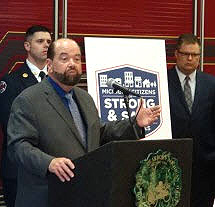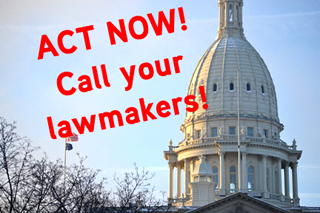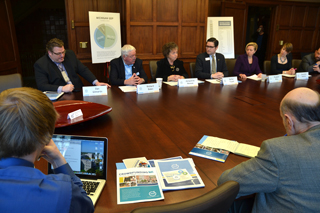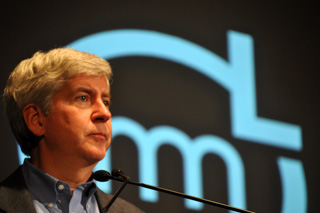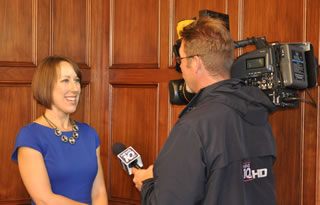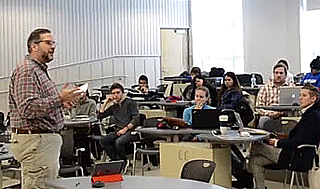
The project starts in the classroom then moves into the city.
The following article is a great example of a town-gown relationship between the University of Michigan and city of Jackson, Michigan. The
Worldclass.umich.edu article, by Laurel Thomas Gnagey, is being reposted with persmission. Check out the related
video here.
As the University of Michigan Blue Bus rumbled down I94 toward Jackson, some School of Information students took advantage of the drive to firm plans for their meetings that day with city officials. Others were engaged in more personal conversations. Perhaps not surprisingly, a few were sitting quietly, tapping on smart phones, tablets and laptops.
Their professor, Clifford Lampe, circulated the bus, answering questions about group projects and sharing copies of the Michigan Municipal League magazine, “The Review,” that had featured the class in the March/April issue. The weekly commute is valuable time for sharing information, bouncing ideas and sorting out issues.
The SI students are the first to be enrolled in Citizen Interaction Design, a course to develop information tools such as apps and social media sites to foster citizen engagement with government. Through a unique three-year partnership, students work on a number of projects with the city of Jackson.
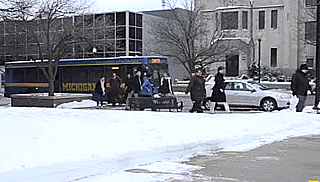
UM students arrive in Jackson.
“The city actually identified 24 problems and we picked 10 of those to move forward with. These aren’t projects like fix my website, these are problems,” Lampe said.
On the March 28 ride to Jackson, James Richardson was “stressing” a bit about the outcome of his team’s work that, at the time, was in the hands of the city attorney for review.
“I just don’t know how it’s going to go,” he told Lampe.
Richardson is part of a team that worked on an open data policy, which would provide the public with access to policies and procedures from the inner workings of the city.
It’s clear from his comments that the second year master’s student will not be content with an “A” for effort on this one, expressing that he hoped the team could get on the city’s agenda to present the policy before the semester ended.
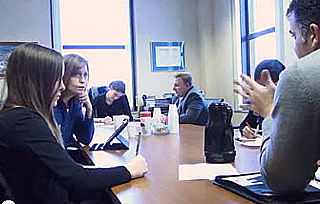
UM students meet with Jackson city leaders.
That opportunity came in April, and at a meeting on the 22nd council members unanimously adopted a first read of the ordinance that could make Jackson the first city in the state to have such a policy. Passage came after a few weeks of earnest debate and a bit of compromise.
Lampe said one of the lessons students learned is that some projects may be embraced wholeheartedly and some may take some time to be adopted, if ever.
“When you try to implement technology it’s the social issues that always are the thorniest,” said Lampe, associate professor in the school.
Another team learned this firsthand as well, tackling an issue many cities face. The group is working with the Jackson Police Department to develop a way for citizens to offer anonymous texts about crime. Department leaders had been hoping for some time to implement a system beyond the current telephone hotline.

Jackson Deputy Chief of Police John Holda talks about the project.
“This spoke to me. It just seemed like something really useful, something very practical, something that the citizens could really get behind,” said student Joshua Sanchez.
John Holda, deputy chief of police, said his department has received feedback from citizens of all ages that they would like to offer information to help solve major crimes like shootings, homicides and robberies in the city, but that they are fearful of retaliation.
“This is an opportunity for us to get something we believe will help us solve crime, help us reduce crime, and have a connection with the community that we don’t currently have in a very cost-effective manner,” Holda said of the Tips by Text app students are developing.
“We’re definitely on the right track to getting it built and implemented,” said student Angela Ng. “We’ve had a lot of support from the police department, which has been really great for us because they’ve really pushed us to move forward.”
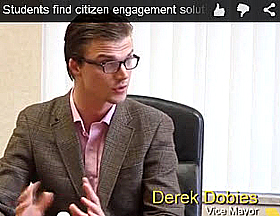
Jackson Vice Mayor Derek Dobies discusses the project.
Yet another group is working on a system for providing the community easier access to city geographical resources.
The Maps and Apps team is working with the Geographical Information Systems Department to take data, including maps, globes, reports and charts, and make them accessible through a web application.
Student Jeremy Wdowik said working on this project has helped him better understand the inner workings of government, and offered a way to be involved while somewhat removed from the politics.
“I always wanted to try to get involved with government but I hate the politics. But when you can get into building things, and doing some cool things for the citizens, that’s when I get really excited,” he said.
Many of the students expressed appreciation that the course offered the chance to roll up sleeves and work on real problems.

Jackson City Manager Patrick Burtch discusses the UM partnership.
“Instead of doing a project that disappears at the end of a semester, this has a potential for being something long-lasting, and that actual people in the Jackson community will interact with,” said student Rachel Seltzer, member of the Maps and Apps team. “ So it’s very nice that it’s not contained to the walls of the classroom and that we’ve gotten to do something in which we’ve brainstormed, problem solved and partnered with an institution.”
City leaders have been impressed with the students’ work.
“I found them to be bright and articulate, and although that didn’t surprise me, I was surprised by the advanced level at which they thought and the processes at which they came to conclusions,” said City Manager Patrick Burtch.
“I think the students have had a real positive experience in having a hands-on opportunity to really dig into city affairs and find a lot of great solutions to our problems,” said Derek Dobies, vice mayor of Jackson.
Lampe gives a lot of credit to Jackson officials for launching into the partnership with the university.
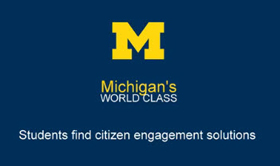 “The great thing about the city is that they were incredibly enthusiastic about the really paradigm shifting approach, both in terms of what our goals is—to increase citizen interaction—but also in terms of reimagining town-gown relationships.”
“The great thing about the city is that they were incredibly enthusiastic about the really paradigm shifting approach, both in terms of what our goals is—to increase citizen interaction—but also in terms of reimagining town-gown relationships.”
Citizen Interaction Design was developed when the School of Information leadership challenged faculty to come up with courses and activities that engaged students in unique ways. SI encouraged engaged learning initiatives across the school by providing financial support for course development. Lampe also was able to secure Third Century Initiative funding.
In addition to the full class, the work on the Jackson partnership began last summer with a single intern, continued with a fall reading seminar that included Jackson officials, and culminated in the winter term design course. This summer half-a-dozen interns will continue to work with the city and the full course will move to the fall semester.
 The letter writing phase of the Vote Yes on Proposal 1 campaign is now in full swing and the Michigan Municipal League has made it as easy as possible for you to send letters to the editor of your local newspapers. We’ve written four sample letters for you to choose from here in our Action Center. Just fill out the information and the Action Center will do the rest, including emailing the letter to your local paper.
The letter writing phase of the Vote Yes on Proposal 1 campaign is now in full swing and the Michigan Municipal League has made it as easy as possible for you to send letters to the editor of your local newspapers. We’ve written four sample letters for you to choose from here in our Action Center. Just fill out the information and the Action Center will do the rest, including emailing the letter to your local paper.


